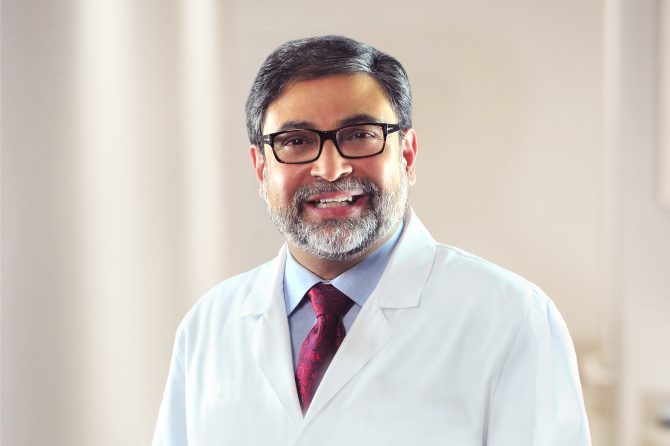
The Pikeville Medical Primary Stroke Center recognizes that American Heart Month is the perfect opportunity to educate the public about the dangers of high blood pressure and atrial fibrillation (AFib), both serious risk factors for stroke.
“Eighty percent of strokes are preventable,” explained Dr. Naveed Ahmed, Primary Stroke Center Medical Director. “It is the leading cause of disability and the fifth leading cause of death in the world.”
High blood pressure is considered the most common controllable risk factor for stroke, but AFib is the most powerful.
A person with high blood pressure has almost twice the risk of stroke than a person without. But someone with AFib has more than five times the risk of stroke.
The American Heart Association/American Stroke Association estimates that 15 percent of strokes that occur in the Unites States each year are caused by untreated AFib. About 2.7 million Americans have AFib and most don’t know what it is or if they have it.
The heart is divided into four chambers. The upper two, or atria, are the collecting chambers for blood returning from the lungs. In normal function, they are supposed to receive a strong electrical impulse to contract and empty out all the blood.
In AFib, a constant stream of electrical energy bombards the atria causing them to quiver instead of fully contracting.
“This is dangerous because it allows blood to pool in the atria, which can lead to clotting,” Dr. Ahmed stated. “If a clot is pumped out of the heart, it can find its way to the brain and block off the blood supply to an artery, causing a stroke.”
Healthy atria contracts 60-80 times per minute. In AFib, they quiver 300-400 times per minute.
The heart in AFib works overtime even if the patient is relaxing. Because of the overactive heart, symptoms of AFib most often include fatigue, lightheadedness, shortness of breath and even fainting. Some AFib patients report feeling a flopping or pounding sensation in their chest. Some patients don’t feel anything at all.
As with many health conditions, the prevalence of AFib increases with age.
According to the Mayo Clinic, fewer than one in every 100 people in their 50s has AFib, but about 10 out of every 100 in their 80s experience it. The most common cause of AFib is longstanding, uncontrolled high blood pressure and heart disease. Additionally, AFib is the most common complication after heart surgery.
Blood pressure is the force of blood pushing against the wall of your arteries as the heart pumps blood. High blood pressure means that your blood is moving through your arteries with a pressure higher than normal. This causes gradual damage to the arteries, including the ones to the brain. A weakened blood vessel may rupture in or near the brain, or diseased arteries may become blocked by a clot or plaque buildup.
High blood pressure usually has no symptoms.
“Nearly one-third of Americans who have it, don’t know it,” Dr. Ahmed explained. “This is also what makes it so dangerous. People can have slow, continued damage to their organs and arteries without feeling bad at all.”
How to Reduce Stroke Risk
Stroke can be prevented, even if you are among the millions with high blood pressure or AFib. Controlling high blood pressure and AFib can greatly lower your chances of having a stroke. Here’s how:
•Don’t smoke.
•Get regular physical activity.
•Maintain a healthy weight.
•Limit alcohol to no more than two drinks a day for men or one drink a day for women.
•Eat a healthy diet that is high in fruits, vegetables, and whole grains, include low-fat dairy products and limit salt, saturated fat, trans fat and cholesterol.
•Monitor your blood pressure and work to keep it at your goal.
•Take your medication as prescribed if you have high blood pressure or AFib.
“PMC is fortunate to have two electrophysiologists on staff who work closely with the Primary Stroke Program to diagnose AFib in patients and work to treat the condition to prevent the risk of stroke.”
Dr. Ahmed treats patients on the 8th floor of the PMC Clinic, as well as the South Williamson Specialty Clinic and the Prestonsburg Specialty Clinic. To schedule an appointment, please call 606-430-2208.









